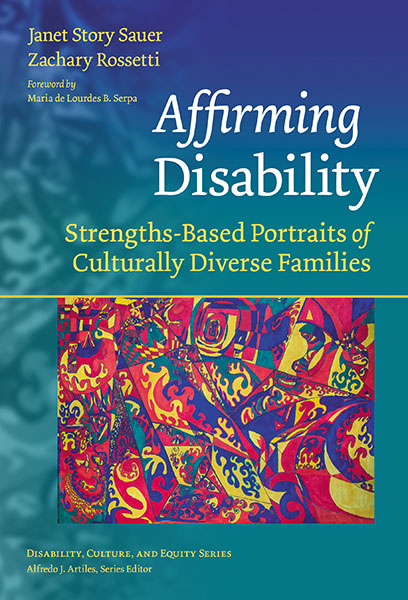Professors: Request an Exam Copy
Print copies available for US orders only. For orders outside the US, see our international distributors.
Janet Story Sauer, Zachary Rossetti
Foreword by: Maria de Lourdes B. Serpa
Publication Date: December 16, 2019
Pages: 176
Series: Disability, Culture, and Equity Series

Providing both a theoretical framework and practical strategies, this resource will help teachers, counselors, and related service providers develop understanding and empathy to improve outcomes for culturally and linguistically diverse (CLD) students with disabilities. The text features narrative portraits of six immigrant families and their children with disabilities, including their cultural histories and personal perspectives regarding assessment, diagnosis, Individualized Education Program (IEP) meetings, and other instances in which families engaged with the special education process. Using guiding questions for reflection and “Talk Back” comments from preservice students throughout the text, readers are encouraged to reflect on their own positionality and to develop nuanced and dynamic understandings of CLD children, youth, and families—countering persistent and stereotypical deficit views.
Book Features:
Janet Story Sauer is a professor of special education at Lesley University. Zachary Rossetti is an associate professor of special education at Boston University’s Wheelock College of Education & Human Development.
“Fills an important gap in highlighting the voices of immigrant families with students with disabilities and in providing resources that guide readers to reflect and develop plans to work more collaboratively with families.”
—Teachers College Record
“To address the inequities associated with the mismatch between students’ diversity and their teachers’ cultural and linguistic backgrounds, this textbook provides a very well-conceptualized, nonhierarchical, research-based learning solution that is inspirational and action oriented….I offer my appreciation and congratulations to the authors for creating a long-overdue textbook that proactively contributes to preparing teacher candidates to know more about and better understand the diverse students they will teach.”
—From the Foreword by Maria de Lourdes B. Serpa, professor emerita of Bilingual EL special education, Lesley University
“Using an accessible style and an innovative format, the authors present six engaging portraits of what life is like for culturally and linguistically diverse families when one or more of the children has a disability. The book will be valuable to students, teachers, and family members—really anyone who has an interest in how disability intersects with race, class, and gender within a multicultural context.”
—Philip Ferguson, professor emeritus of education, Chapman University
“A powerful and much-needed book! Through compelling portraits of six diverse immigrant families of children with disabilities, it highlights the cultural misunderstandings and systemic inequities that can occur when disability intersects with race. The authors further the discourse on capabilities-focused approaches to building parent–professional relationships by presenting cultural humility as an ongoing process of learning.”
—Maya Kalyanpur, professor, University of San Diego
Contents (Tentative)
Foreword Maria de Lourdes Serpa
Acknowledgments
1. Forging Connections in Family Engagement
Structure and Goals of the Book
Developing Cultural Humility to Foster Family Engagement
Theoretical Framework—Disability Studies in Education
Methodology—Strengths-Based Portraiture
Conclusion
References
2. “We Call Ourselves Chinese”: The Ou Family Portrait
Susan Ou and Janet Sauer
Susan: “I’m a risk taker.”
Developing Cultural Understanding
Chinese Family Diversity
Chinese Immigration
School and Family Engagement: “Do some research.”
The Assessment and Diagnosis Process: “A kid is a whole person.”
The Children: Bruce and Ian
Conclusion
Reflection Questions
References
3. “A Girl Who Has Beauty Inside and Out”: A Portrait of a Vietnamese Mother and Daughter
Oanh Thi Thu Bui, with Zach Rossetti
Immigrating to the United States
Cultural Context: Vietnam
Multiple Diagnoses, Multiple Meanings Across Cultures
Navigating the Special Education System
Learning to Advocate
The Power of Daily Communication Between Home and School
A Voice for My Daughter
Fighting for Appropriate Services
Engaging as a Cultural Broker
Differing Views of Tiny
Parental Roles and Ongoing Learning
Conclusion
Reflection Questions
References
4. “Ella Me Apoyó”: A Latina Mother´s Journey Through the Special Education System
Maureen Lothrop Magnan
The Act of Cultural Brokering
The El Salvadorian–Mexican Restaurant
A Failure to Translate
Chaos on an IEP
The Power of Words
Negative Name Calling
“We demand that our children receive the special education services they need.”
Continuing to Learn, Fight, and Push Onward
María’s Youngest Son
Conclusion
My Own Interfering Experiences
Connecting through Motherhood
Reflection Questions
References
5. Mother Tongue: Sachin and His Indian American Family
Punita R. Arora, with Janet Sauer and Zach Rossetti
Who Is Sachin?
Who Is Sachin’s Family?
Cultural Context
Who Is Punita?
The Family and the System
Change of School, Change of Services
Conclusion
Reflection Questions
References
6. Lessons of Abundance in an Iranian American Family
Kimiya Sohrab Maghzi
Our Samin Banoo
The Lived Experience
The DisCrit Lens
Introducing Samin
Shirin’s Story
The Importance of Intentionality
Denial, Desperation, and Religion
Barriers to Home–School Collaboration
Team Parenting
Final Thoughts from Shirin
Conclusion
Reflection Questions
References
7. A Goat Among Lions: Unveiling the Challenges Faced by a Somali Refugee Mother of a Child with Autism
Sahra Bashir and Amy Gooden
Attitudes Toward Disability in Somali Culture
Gacmo is dhaafaa gacalo ka timaaddaa: Love emerges when hands give something to each other.
Khayr wax kuuma dhimee shar u tog hay: In good times, be ready for bad times (because times always change).
Ri yar iyo libaax: I felt like a little goat among the lions.
War la qabo xiiso ma leh: What is known is not interesting.
Iskaashato ma kufto: If people support each other, they do not fall.
Reflection Questions
References
8. Knowledge to Action: Enacting Cultural Humility
Personal Action Plan for Change
Conclusion
References
Index
About the Authors
View a panel discussion with some of the researchers and family members from the book.
Professors: Request an Exam Copy
Print copies available for US orders only. For orders outside the US, see our international distributors.